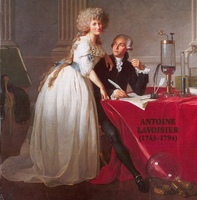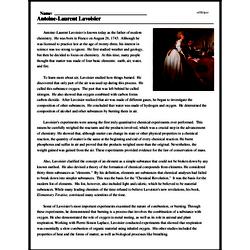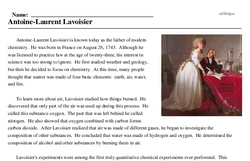Antoine-Laurent Lavoisier
Antoine-Laurent Lavoisier is known today as the father of modern chemistry. He was born in France on August 26, 1743. Although he was licensed to practice law at the age of twenty-three, his interest in science was too strong to ignore. He first studied weather and geology, but then he decided to focus on chemistry. At this time, many people thought that matter was made of four basic elements: earth, air, water, and fire.
To learn more about air, Lavoisier studied how things burned. He discovered that only part of the air was used up during this process. He called this substance oxygen. The part that was left behind he called nitrogen. He also showed that oxygen combined with carbon forms carbon dioxide. After Lavoisier realized that air was made of different gases, he began to investigate the composition of other substances. He concluded that water was made of hydrogen and oxygen. He determined the composition of alcohol and other substances by burning them in air.
Lavoisier's experiments were among the first truly quantitative chemical experiments ever performed. This means he carefully weighed the reactants and the products involved, which was a crucial step in the advancement of chemistry. He showed that, although matter can change its state or other physical properties in a chemical reaction, the quantity of matter is the same at the beginning and end of every chemical reaction. He burnt phosphorus and sulfur in air and proved that the products weighed more than the original. Nevertheless, the weight gained was gained from the air. These experiments provided evidence for the law of conservation of mass.




